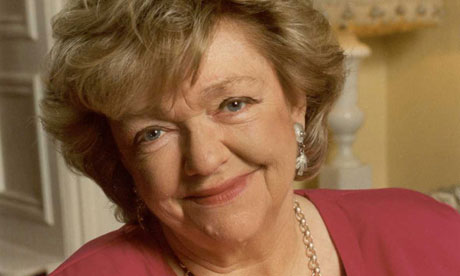
Maeve Binchy was one of the most vibrant personalities I've ever known. She was a tireless worker, a prolific writer and a fiercely intelligent woman with a shrewd eye for human foibles, an acerbic sense of humour and an immense enthusiasm for life.
We met when I was a stroppy Dublin teenager and she was my Latin teacher. Maeve taught by sheer strength of personality and wasn't a woman to suffer fools gladly. Even then she was a brilliant storyteller. And as a disciplinarian, she took no prisoners. I remember re-enacting the death of Julius Caesar once, after a spirited Roman history lesson, and looking up to find myself transfixed by a cold eye. My fellow assassins backed away leaving me frozen between the desks. Maeve gazed at me distantly for what felt like hours and then turned away with a weary sigh. That was it. Nothing more. But it was devastatingly effective.
I reminded her of that when I last saw her, a month ago. I'd just published a book and, typically, Maeve had offered to do a "How we met" piece with me for a newspaper. Having given up her teaching career to be a writer, she'd gone on to become a household name whose novels had sold over 49 million copies worldwide. But she'd never lost her instincts as a mentor and, as a result, she'd kept in touch with my career as an actress.
When I got my first job in the London theatre and she was still working as a journalist for the Irish Times, she took me to lunch in Joe Allen's and discovered I'd begun writing scripts for the BBC. In 10 minutes, on the back of a napkin, she'd sketched out a five-year plan for my career and thrown in several suggestions of plots for radio plays. Being young, and still fairly stroppy, I ignored her. But, despite my inability to appreciate what she'd given me, she never ceased to offer me generous, shrewd and practical advice.
Years later, when I worked as a scriptwriter on the development of a series of her short stories, I realised how those qualities of shrewdness and clear-minded intelligence underpinned the warmth and charm of her feelgood novels. This is what gave them their worldwide appeal. She was a joy to work with, though she still took no prisoners. No one knew better than Maeve that working writers tend to juggle several projects at once, yet whenever she rang to discuss a draft based on her work, she expected your pencil to be sharpened and her script to be by the phone. But her notes were miracles of precision and she had a crystal clear sense of her characters and of her own voice as an author. She demanded nothing less than 100% from anyone who worked with her. And she demanded no less of herself either.
She always insisted she was a storyteller. "You analyse things as a writer, but I don't. I'm just delighted by them and write them down." I remember arguing and saying that was nonsense, and I don't think she really believed it. In recent years she consciously balanced the recognisable Maeve Binchy charm of her work with more modern themes, and introduced a sharper edge to her humour and a darker tone to her stories of contemporary Irish life. I remember her saying that she'd love to know if her work would stand the test of time. I think she got the balance right, and I believe it will.
We never did the "How we met" piece. Her health was failing when I last saw her. Shortly afterwards, when we spoke on the phone, she said she felt too tired to be interviewed, and suggested I write a piece about our relationship myself. I was unsure but I could hear she was tired so I said I'd have a go, on the condition that she'd read what I'd written before it went to print. She laughed again and said she had to rush. Although her hands were paining her and she'd been feeling unwell she was still writing and she had a deadline to meet. "I don't need to read it, I trust you," she said, and hung up.
I'd already started writing it when a colleague texted me this morning to tell me she had died. As I sit here writing this now, the whole thing feels surreal. It doesn't seem possible that someone so full of energy and enthusiasm, so positive, shrewd and humorous to the very end can really be gone. Millions of readers around the world will miss her as a writer who spoke to them so directly that they felt she was their friend. Many writers like myself will miss her as a friend who was also the best of teachers.

